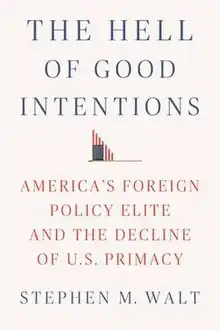The Hell of Good Intentions
The Hell of Good Intentions: America's Foreign Policy Elite and the Decline of U.S. Primacy is a book by Stephen M. Walt, which focuses on the foreign policy of the U.S. Government. According to the Belfer Center for Science and International Affairs, Walt unveils the reality of White House foreign policy and argues that past U.S. presidents such as Clinton, Bush and Obama, avoided accountability for repeated failures of their foreign policies. He also argues that such foreign policy mistakes contributed to the election of Donald Trump as president. [1] In the book, Walt offers his take on what U.S. foreign policy should be and suggests that U.S. politicians should change their foreign policy approach.[1]
 Book cover | |
| Author | Stephen Walt |
|---|---|
| Country | United States |
| Language | English |
| Genre | Non-fiction books about world affairs |
| Publisher | Just World Books |
Publication date | 18 October 2018 |
| Pages | 400 |
| ISBN | 978-1935982333 |
Content
In this book, Stephen M. Walt, a professor of international affairs at Harvard University, reviews U.S. foreign policy and its results over the past quarter century.[1] Lloyd Green, of The Guardian website writes that Walt places the onus for what he argues is the decline of the U.S. on its foreign policy, and that he argues for an "offshore balancing strategy", under which the U.S. would allow regional actors to play out their own conflicts.[2] This foreign policy strategy is similar to the approach of ex-President Richard Nixon.[2] The author argues that the U.S. has spent trillions of dollars abroad fighting terrorists, attempting to expand democracy, or ensuring the security of other countries. He also believes that these strategies failed to achieve their goal.[1]
The author presents an analysis of the foreign policies used by the Clinton, Bush and Obama administrations. He goes on to argue that these foreign policy strategies were failures and the presidents responsible have been able to avoid accountability. Walt argues that past presidential failures facilitated Donald Trump's bid to become U.S. president.[1] The author argues that U.S. foreign policies in other countries have changed over time from using military force to expanding democracy to maintaining a balance of power.[1]
The author outlines a number of different potential foreign policy strategies. He explores some of these policies, including: offshore balancing, which calls for the U.S. to focus its offshore capabilities on Europe, the Persian Gulf, and Northeast Asia, using favored regional powers to check the rise of potentially-hostile powers; and the Nixon Doctrine, a position expounded by ex-President Nixon, that every crisis does not warrant American troops and firepower, and that American involvement can engender resentment and blowback in American society. Walt declares to his readers the folly of grand ambitions and says "doing something" can be far more costly than watching and waiting.[2] Finally, Walt proposes his own foreign policy strategy. He advocates for offshore balancing, a return to diplomacy, and the prioritizing of peace.[1]
References
- "The Hell of Good Intentions: America's Foreign Policy Elite and the Decline of U.S. Primacy". belfercenter. Harvard Kennedy School,Belfer center. Retrieved 23 January 2019.
- Green, Lloyd (24 November 2018). "The Hell of Good Intentions reviews: the decline of US foreign policy". theguardian.com. Guardian. Retrieved 26 January 2019.
External links
- Stephen Walt (November 2011). "Offshore Balancing: An idea whose time has come". Foreign Policy.